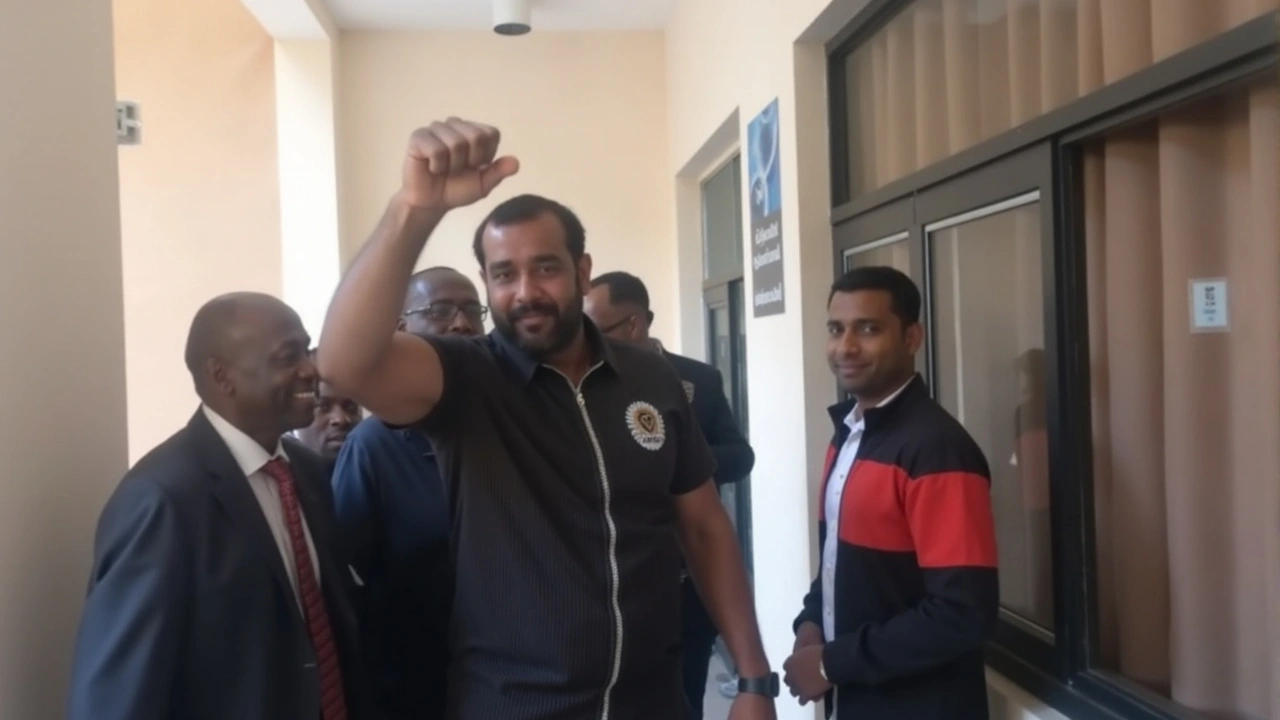Whistleblower PIDOM's Remand: Unveiling Allegations of Cybercrime and Money Laundering
 Sep, 4 2024
Sep, 4 2024
Whistleblower PIDOM Remanded: A Deep Dive into the Allegations
In a riveting court case that has captured national attention, Justice Emeka Nwite of the Federal High Court in Abuja has ordered the remand of Isaac Tamunobifiri, widely known as PIDOM, in Kuje correctional facility. PIDOM, who has garnered a reputation for whistleblowing, now stands accused of a slew of serious charges. The court proceedings featured a detailed investigation and numerous complex allegations ranging from money laundering to cybercrime, all tied to his activities as a whistleblower.
The arraignment, which took place on Tuesday, involved a total of nine counts brought against PIDOM by the Inspector General of Police. The severity of these charges was underscored by the nature of the allegations, which also involved the mobilization and solicitation of support through the contentious #EndBadGovernance protest. Moreover, it included accusations of false money-laundering claims against key public figures, including President Bola Tinubu. One of the more alarming charges involved PIDOM unlawfully obtaining and disseminating classified documents, a direct contravention of the Official Secret Act of 1962.
The Details of the Charges
Breaking down these charges reveals a strikingly layered case. The first count specifically accuses PIDOM of accessing a computer network to mobilize support using his social media handle, @Pidomnigeria. The intent, according to the charge, was to galvanize the #EndBadGovernance movement. A movement that had previously stirred substantial civil unrest and called for sweeping governmental reforms.
Count two paints a particularly provocative picture. PIDOM allegedly transmitted a classified document that falsely claimed President Tinubu had released a large sum of money to the Chairman of the National Hajj Commission of Nigeria (NAHCON). This claim, the charge elaborates, was intended to provoke public disorder. The insinuation of high-level corruption certainly has provoked a mixed array of public responses.
Claims of Criminal Intent
The charges do not stop there. Another accusation states that PIDOM engaged in money laundering and other criminal activities to fund his whistleblowing endeavors. According to the police, the funds PIDOM utilized were acquired through illicit means. This argument forms the crux of the financial crime allegations against him.
In the most dramatic instance, count nine accuses PIDOM of attempting to destroy evidence. Allegedly, he destroyed his Tecno Phantom X phone in a bid to flush it down the water system at the hotel where he was eventually arrested. This act, the police argue, was a deliberate attempt to tamper with the evidence, thereby obstructing justice.
The Courtroom Drama
PIDOM appeared unyielding in court, pleading not guilty to all the charges. His defense counsel, Deji Adeyanju, was quick to apply for bail, which led to a spirited objection by the prosecution's counsel. The prosecution insisted on the gravity of the charges and the potential risks of granting bail. The court thus adjourned the case to September 23 for a ruling on the bail application and ordered PIDOM's remand in Kuje correctional centre in the interim.
The charges have not only ensnared PIDOM but have also implicated other notable figures. The police investigation named investigative journalist David Hundeyin and one Michael Alade as alleged accomplices. This revelation has added an extra layer to the developing narrative, putting the spotlight on other members of the journalistic community and potentially broadening the scope of the investigation further.
Investigation and Arrest
The investigation that led to PIDOM’s arrest was initiated following a petition from the Office of the Secretary to the Government of the Federation. The petition made alarming claims about PIDOM’s activities, alleging that these were calculated efforts to jeopardize national security. It wasn't long before a police team tracked him down to a hotel in Port Harcourt, where the arrest unfolded in a dramatic fashion. According to the authorities, PIDOM resisted arrest, barricaded himself inside the hotel room, and ultimately destroyed potential evidence by attempting to flush his phone down the toilet.
Further allegations presented by the police suggest that PIDOM raised funds anonymously to sponsor activities labeled as cyber-terrorism. These funds were purportedly used to acquire restricted documents which he then disseminated to public platforms. One such document reportedly included direct directives from the Office of the Inspector General of Police, insidiously penetrating the Nigerian security apparatus.

Implications and Public Reactions
The case against PIDOM has sparked widespread debate. Some defend his actions as those of a dedicated whistleblower exposing systemic corruption. Others view him as an embodiment of cybercrime, leveraging sensitive information for personal gain. The polarizing perspectives have stirred discussions on the ethical boundaries of whistleblowing and the implications for national security.
The #EndBadGovernance movement, which PIDOM is accused of supporting, underscores the nuanced role of social media in modern protest. While it provides a platform for civil resistance and freedom of expression, it also opens avenues for potential misuse. The allegations against PIDOM are imbued with this complexity, raising questions about where to draw the line between activism and criminality.
The Road Ahead
As PIDOM awaits his bail verdict, the spotlight remains firmly fixed on the upcoming September 23 court date. The ramifications of this case could extend well beyond the fate of a single whistleblower. It serves as an intricate test of Nigeria’s judicial system, the country’s cyber laws, and the balances between national security and individual freedom.
Legal experts and civil rights activists are keenly observing the proceedings. The outcome could set a precedent, influencing how similar cases might be handled in the future. The charges carry significant weight, but they are juxtaposed against PIDOM's notoriety and the fact that whistleblowing itself is not illegal.
As the trial progresses, more details are expected to emerge, potentially bringing clarity to a complex web of allegations and defenses. For now, PIDOM remains a figure both vilified and venerated, reflecting the polarized public sentiment surrounding his case. The story of PIDOM is sure to continue unfolding, each new development likely intensifying the already charged atmosphere around it.